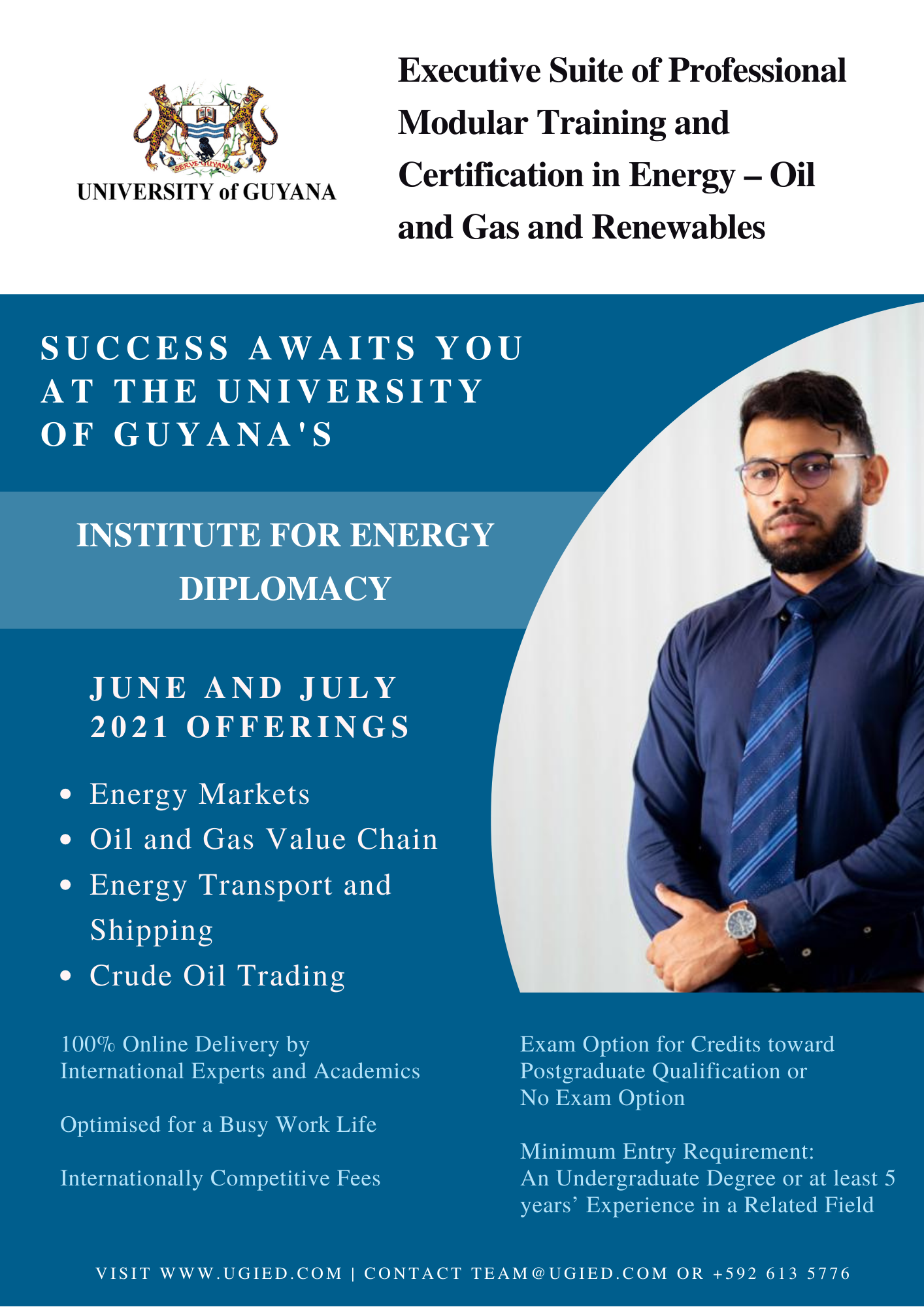The University of Guyana’s Institute for Energy Diplomacy has announced a suite of Executive Level Professional Courses to begin in June 2021. Courses are being taught by leading international academics and experts from Universities around the world with long track records in training for the energy sector.
The Institute will deliver a minimum of two professional courses per month for the rest of 2021 and expects to accelerate its offerings in 2022. IED aims to certify several hundred persons across various disciplines in its first year of offerings commencing from June 2021 as the University rolls out its programmes in an effort to help fill the performance gaps and expressed interests of professionals in Guyana and the region.
The professional courses currently being offered are:
1) Energy Markets
2) Oil and Gas Value Chain
3) Energy Transport and Shipping
4) Crude Oil Trading
The courses cover not only a range of upstream, midstream, and downstream oil and gas activities but equip participants with wider energy training. Prospective participants are expected to possess an undergraduate degree or at least five years of experience in a related field.
Each professional course is assessed by a 100% final-online exam and is taught over 1 or 2 weeks. Person’s may opt for an exam or no exam mode. However, it should be noted that the certification and costs of the two options will differ. The main difference is that those taking the exams for course credits will have the option of adding these to other offerings with The University of Guyana for a postgraduate diploma in the future based on the modular framework of courses offered through the Institute for Energy Diplomacy.
IED Founding Director Alex Armogan, stated that IED’s professional courses are optimised for online delivery and a busy work life.
The University of Guyana has pioneered domestic tertiary level education for fifty-eight years. Today, via its Institute for Energy Diplomacy, UG is leading the push for professional energy training to meet the evolving skills gap. The Institute’s courses are guided by past and ongoing work done by UG and international organisations to map knowledge gaps. UG’s professional training facilitates the need for Guyana to become a fast-energy learner. Director Armogan emphasised that while IED’s primary focus is on the Guyana-Suriname basin, the international quality of the course content and online delivery, added to the prestigious University of Guyana certification, makes the Institute’s courses internationally attractive.
The brief description of the first suite of Executive Courses being offered by UG’s Institute of Energy Diplomacy are as follow:
Energy Markets
This course provides fundamental knowledge of energy market economics. The aim is to provide you with an energy-specific toolkit, which will allow you to understand the broader economic concepts and issues in this sector. Areas covered include energy demand, oil and refined products, natural gas, electricity and renewables. Other energy-specific courses will cover more detailed operational and financial issues.
Oil and Gas Value Chain
This course provides participants with an overview of the key business aspects of the Oil and Gas Business, with an emphasis on the upstream petroleum business. It explores the oil and gas value chain, key contracting and portfolio management, risks and challenges in the 21st century and discusses the important functional management issues, including technical, financial, environmental, and social.
Energy Transport and Shipping
This course provides fundamental knowledge of energy transportation and the tanker shipping market. The main aim is to provide participants with the skills and tools required to understand broader terms, concepts and issues in the oil and gas shipping sector in Guyana. The module consists of six topics with an introduction of energy transportation, the world tanker market and operations, shipping contracts and freight market economics, and international regulations in shipping.
Crude Oil Trading
This course provides fundamental knowledge of energy trading economics. The aim is to pro vide you with an in-depth study of the energy industry structure and strategies, study the fundamentals of oil and energy trading economics and relate those to current market trends. You will be introduced to the key issues involved in physical and financial energy trading as well as advanced issues related to the production and trading of oil before dealing with more detailed operational issues, which are covered in other energy-specific courses. Areas covered include oil pricing mechanisms, trading strategies, contracts and contract exposures, and risk management.
Interested persons can visit www.ugied.com or contact the Institute directly at team@ugied.com or +592 613 5776 for more information.
